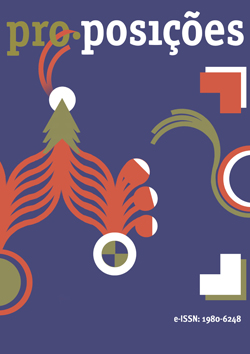Abstract
Based on the thought of Theodor Adorno, this article aims to relate the concept of childhood with those of civilizational process and education. In view of the main diagnosis of the so-called “critical theory” of society – i.e., the one of the interlacing between myth and enlightenment throughout the process of development of the Western civilization – the intention is to demonstrate how childhood, through its specific dynamics, can be seen as a kind of promise that beckons to the possibility of a “right life” amidst the understanding that “there is no right life in the false one”. This reflection should also serve to point out some consequences of the perception of childhood in the Adornian idea of education.
References
Adorno, T. (2003a). Amorbach. In Kulturkritik und Gesellschaft II (pp. 302-308). Suhrkamp: Frankfurt a. M.
Adorno, T.(2003b). Auf die Frage: Warum sind Sie zurückgekehrt [Sobre a pergunta: por que o senhor voltou]. In Vermischte Schriften (pp. 394-395). Suhrkamp: Frankfurt a. M.
Adorno, T. (2003c). Theorie der Halbbildung [Teoria da pseudoformação]. In Soziologische Schriften I (pp. 93-121). Suhrkamp: Frankfurt a. M.
Adorno, T. (2006). Educação e emancipação (W. L. Maar, Trad.). São Paulo: Paz e Terra.
Adorno, T. (2008). Minima moralia (G. Cohn, Trad.). Rio de Janeiro: Azougue.
Adorno, T., & Horkheimer, M. (1985). Dialética do esclarecimento (G. de Almeida, Trad.). Rio de Janeiro: Jorge Zahar.
Ariès, P. (1981). História social da criança e da família (D. Flaskman, Trad.). Rio de Janeiro: Editora LTC.
Benjamin, W. (2007). Reflexões sobre a criança, o brinquedo e a educação (M. V. Mazzari, Trad.). São Paulo: Duas Cdades, Editora 34.
Benjamin, W. (2010). Berliner Kindheit um 1900 [Infância berlinense por volta de 1900]. Frankfurt a. M.: Suhrkamp.
Caillois, R. (1972). O mito e o homem (J. C. dos Santos, Trad.). Lisboa: Edições 70.
Boto, C. (1996). A escola do novo homem: entre o iluminismo e a Revolução Francesa. São Paulo: Unesp.
Freud, S.(1929/2010). O mal-estar na cultura (R. Zwick, Trad.). São Paulo: L&PM.
Gagnebin, J. M. (2005). Do conceito de mímesis no pensamento de Adorno e Benjamin. In Sete aulas sobre linguagem, memória e história (pp. 79-104). Rio de Janeiro: Imago.
Rousseau, J.-J. (1762/1995). Emílio, ou da educação (S. Milliet, Trad.). Rio de Janeiro: Bertrand Brasil.
Thompson, E. P. (1998). Introdução: costume e cultura. In Costumes em comum: estudos sobre cultura popular tradicional (pp. 13-24). São Paulo: Companhia das Letras.
Wiggershaus, R. (1988). Theodor W. Adorno. Munique: C. H. Beck.
Prill, M., & Schneider, K. (Diretores). (2003). Theodor W. Adorno – Der Bürger als Revolutionär [parte 1].
Prill, M., & Schneider, K. (Diretores). (2003). Theodor W. Adorno – Wer denkt, ist nicht wütend [parte 2].
A Proposições utiliza a licença do Creative Commons (CC), preservando assim, a integridade dos artigos em ambiente de acesso aberto.


